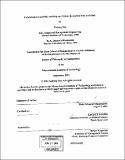Technological capability catching up : follow the normal way or deviate
Author(s)
Gao, Xudong, 1966-
DownloadFull printable version (10.48Mb)
Other Contributors
Sloan School of Management.
Advisor
Edward S. Steinfeld.
Terms of use
Metadata
Show full item recordAbstract
The thesis explores a puzzle in technological capability development: many firms in China follow the "normal" way of technological capability development suggested by the existing literature but have not made much progress, while some firms that deviate from the "normal" way have made impressive progress. The thesis uses a multiple-case replication design to identify the key factors and mechanisms that affect technological capability development in China. Six cases are studied, each of which is treated as an independent experiment. The study does not follow any specific theory of technological capability development in order for conceptual insights to emerge. The study finds that technological capability development in the 6 firms studied is affected by three groups of factors-R&D characteristics, organizational conditions, and environmental conditions, and that these three groups of factors also form a nested relationship. First, technological capability development is directly influenced by R&D characteristics such as the timing of investing in R&D, level of R&D, human resources in R&D, collaboration with the knowledge frontier, and focus of R&D. R&D with the characteristics of early start, high level of investment, high quality human resource, deep collaboration with the knowledge frontier, and focusing more on knowledge intensive technology are more likely to lead to the development of proprietary technology. Second, characteristics of R&D are directly affected by organizational conditions such as urgency, confidence and resources in developing proprietary technology. High urgency and high confidence are more likely to lead to R&D characteristics more conducive for technological capability development. (cont.) Third, organizational conditions for technological capability development are directly affected by environmental conditions such as MNEs' policy of technology transfer, MNEs' policy of engagement in the local market, mechanism of industrial coordination in technology development, and mechanism of industrial coordination in market access. Low technology transfer policy of MNEs is more likely to lead to high urgency for proprietary technology development, while high technology transfer policy of MNEs is less likely to lead to high urgency for proprietary technology development. Decentralized coordination is less likely to help firms in developing countries to develop the confidence to develop proprietary technology than certain kind of centralized coordination. It is also less likely for firms in developing countries to generate the resources needed to develop proprietary technology if MNEs are willing to transfer technology and have a policy of deep engagement in the local market, and if the industrial coordination mechanisms in both technology development and market access are decentralized. The TV set firms are less innovative than the telecom equipment firms because they have less conducive R&D characteristics, organizational conditions, and environmental conditions for technological capability development. The findings of this study offer insights and suggest a new framework for the understanding of technological capability development for firms in China, and possibly in other developing countries ...
Description
Thesis (Ph. D.)--Massachusetts Institute of Technology, Sloan School of Management, 2003. Leaf 190 blank. Includes bibliographical references (leaves 184-189).
Date issued
2003Department
Sloan School of ManagementPublisher
Massachusetts Institute of Technology
Keywords
Sloan School of Management.